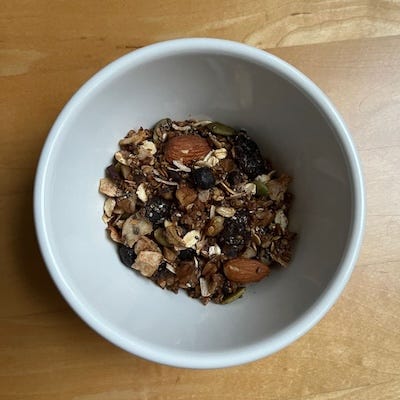My take on Collagen (I don't follow the masses)
My path to finding out if women in midlife really need collagen
I take a ton of supplements each day. I believe in today’s world, they’re absolutely necessary for health. (Because of soil health, issues with the food supply, the quality of our air, and more.)
But here’s the thing: I don’t take a supplement just because it’s the “in” thing to do. Research is key in my world.
I get skeptical when I see industries form at the speed of light. Is it really something we’ve been lacking for generations, or is it a new way to make money? The collagen craze has created a multi-billion dollar industry in under ten years, but is it necessary?
Collagen is an important nutrient we need for a healthy aging process. Collagen is the most plentiful protein in the human body; proper levels promote better muscles, bones, tendons, ligaments, organs, blood vessels, skin, intestinal lining, and other connective tissues.
This isn’t something you can schedule a blood test for, or have a doctor determine or measure how much collagen you have.
Still, the news stories about collagen are everywhere. The titles pull you in.
Collagen is a must for women in midlife
The benefits of collagen for aging skin
Collagen – will it help smooth your wrinkles?
But do women really need collagen in midlife and beyond as they try to reduce wrinkles and be their best versions of themselves?
So, I went searching to decide for myself if I needed collagen.
What is collagen?
While collagen might seem like a new trend, it’s actually centuries old.
Chinese women have been ingesting collagen for centuries, viewing it as a fountain of youth.
We’ve turned it into a billion-dollar business in just the last decade alone. (Yep, that’s billion with a B.)
In 2014, collagen supplements were a $50 million business. By 2025, it’s projected to bring in $6.5 billion in sales.
Collagen is a protein that binds tissues in fish and animals. In most cases, manufacturers grind up cow or fish parts, and turn them into “miracle” drugs. You can pop a supplement, or mix it into your morning coffee.
We all produce collagen. It’s a protein found in our connective tissues, cartilage, bones, and tissue. It keeps our nails healthy, and gives our joints a full range of movement. It plumps the skin, and keeps the wrinkles at bay.
While collagen is easily produced in our younger years, production wanes as we age. From early adulthood on, collagen production declines each year. This can also be aggravated by lifestyle choices, such as smoking, sunlight, and pollutant exposure.
The beauty industry, of course, is always looking for ways to create and sell new products. As studies poured in showing collagen can help relieve dryness and reduce wrinkles, products hit the market at record speed. Celebrities like Jennifer Aniston are partnering with mega-brands to sell their own collagen powders and supplements.
But is all of that necessary? Does collagen really help as you age? Or is it just more hype?
What breaks down collagen
Age is the biggest reducer of collagen. Genetics is also at play. Take a good look at your parents and grandparents to see what’s in store for your future.
Of course, this breakdown rate varies from person to person based on lifestyle choices. And this is where you have your biggest control.
Diet
Nutrient deficiencies can prevent collagen from forming. And thanks to fast food, prepackaged meals, and monocropping, our food supply is nutritionally deficient at best. Our current diet consists of lots of sugar and refined carbohydrates, low amounts of antioxidants and minerals. If you want to slow collagen loss, change your diet to include plant-based eating. Broccoli, spinach, carrots, avocados, beets, radishes, and sweet potatoes are all high in antioxidants, and give you better nutrition through your foods.
Sunshine
Sun exposure allows too much UV radiation into your body. While modest amounts are needed to maintain healthy levels of nutrients like vitamin D, too much sun stresses the skin and increases your chance of disease.
Smoking
It’s one of the worst habits for impacting your skin. Smoking increases the risk of wrinkles, and they will become more noticeable, especially around the mouth, crow’s feet by the eyes, and at your brow line.
Stress
Stress is a leading contributor to bad health. From heart disease to autoimmune disease, to collagen deficiencies, your body releases more adrenaline the more stressed out you are. This requires your body to work on other issues rather than healing and skin repair.
Do we need collagen as we age?
I take a handful of supplements every day. If the evidence supports it, I try it. I guess that’s the biohacker in me. With collagen, the way it’s produced has me leery. I’m a vegan/plant-based lifestylist for a reason.
The jury is still out on whether we need supplemental collagen as we age. If you dig deep enough into the short history of collagen products, you’ll find just as many opposing opinions as positive ones.
What’s more, collagen is an unregulated industry. That means buyer beware – not all collagen will be created equally.
According to the Organic Consumers Association, when they tested 28 of the top-selling brands of collagen supplements, they found:
64 percent tested positive for measurable levels of arsenic
37 percent tested positive for measurable levels of lead
34 percent tested positive for trace levels of mercury
17 percent tested positive for measurable levels of cadmium
Most collagen supplements come from animals raised on factory farms. These animals are exposed to a variety of conditions, including heavy metals. It can come from a variety of places, including the antibiotics they are fed, contaminated grain, and poor living conditions.
The heaviest concentration of these toxins end up in bones and tissue, the very thing ground up and served as collagen in your supplements, powders, and creams.
Not really what you’re looking for in a healthy supplement, right?
Want plant-based collagen? They’re out there. Some enterprising companies are creating plant-based collagen. Again, for me, it’s all about production. They bio-engineer it from yeast and bacteria. It’s all very new …
So for now, I believe the best place to get collagen is from plant-based foods.
Another thing to consider: Collagen is found in animal products that contain connective tissue. However, the human body can’t absorb collagen in its natural form. As you ingest collagen powders and supplements, it takes the nutrients and prioritizes them to enhance your collagen production.
Short answer - there really isn’t a guarantee that collagen targets the specific areas they claim.
I believe most of life is lived the fast way or the sllooowwww way. They want us to believe we can get everything we need from a pill - take it fast to arrive at the solution. Yet a pill often provides you with a false sense of hope, and a reason to avoid practicing healthy behaviors. Slow behavior changes your lifestyle, makes you consider your choices carefully, and prioritizes what’s most important based on how it manages your wellness.
Hence, what it does for your wellth!
Which means - in my opinion - the best way to help your body produce collagen is through lifestyle choices.
There are other ways to get the same boost to your system … with food. Certain plants are also high in nutrients that boost production.
Copper – supports a body’s elastin and collagen function. You can find this in tofu, leafy greens, and dried fruit.
Iron – your body uses iron to maintain existing collagen. You’ll find it in tofu, legumes, nuts, seeds, and leafy greens.
Polyphenols – reduce oxidative damage and inflammation in the skin. You’ll find polyphenols in fruits and vegetables such as grapes, berries, peppers, cabbage, and garlic.
Vitamin C – citrus fruits, peppers, strawberries, kiwis, and tomatoes all have antioxidants that combat oxidative stresses that degrade existing collagen.
Vitamin E – an antioxidant that protects collagen from oxidative damage. Include nuts, seeds, leafy greens, avocados, and tropical fruits like mangos and kiwis in your diet.
Zinc – breaks down and repairs collagen, as well as supports skin health and integrity. Get daily zinc in nuts, seeds, legumes, and whole grains.
Not so difficult, right?
Fruits and vegetables. Nuts and seeds. Add in tofu and some leafy greens. All a healthy part of a plant-powered lifestyle.
Want a plant-based recipe to start your day?
I believe food is an energy source and a way to fuel your body properly. Of course, that doesn’t mean food can’t be delicious too. I start every day with a smoothie bowl – my delicious homemade granola, and a blended smoothie made from real food.
My Homemade Granola Recipe❤️
I pair this with my delicious plant-based smoothies for Gorgeous smoothie bowls every single morning. I use only organic products wherever possible. You can mix and match your favorite ingredients. Or include it all! It stores well, and I often carry it with me when we travel.
½ cup oats
1 cup cooked quinoa
½ cup dried fruit – pick your favorites: blueberries, cranberries, raisins, cherries, etc
½ cup coconut flakes
½ cup sunflower seeds
½ cup pumpkin seeds
½ cup chia seeds
½ cup flax seeds
½ cup cacao nibs
½ cup pecans
½ cup walnuts
½ cup almonds
Cinnamon, to taste
Maple syrup or honey, to taste
Directions:
Mix all ingredients except for maple syrup or honey. Spread on a baking sheet, and add a touch of maple syrup or honey on top.
Preheat oven to 300 degrees Fahrenheit. Bake for 15 minutes. Mix the cereal. Bake for another 15 minutes. Cool. Store in air-tight containers.
I hope you enjoy this little piece of breakfast heaven as much as I do. ❤️
Lori
p.s. Did you like this message? It would mean a lot to me if you’d press the ❤️ below if you liked it, left a comment 💬, or shared it with a friend. I’m trying to grow this publication, and I depend on people like you to do so!
And if you’re new here, Welcome! 💐 I’d love to start sharing my message with you if you’re interested in all things plant-powered, proaging, or finding kitchen joy. Subscribe … and then explore my entire archive! Glad to share with you! 🙋🏼♀️










